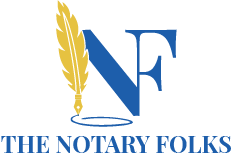
Understanding the key differences between a notary public vs loan signing agent is crucial and can save you time, money, and potential headaches. Imagine this: you’re about to close on your dream home, facing a mountain of paperwork. Suddenly, you’re unsure whether to call a notary public or a loan signing agent. It’s a common question, and knowing the answer can make all the difference. While both professionals play vital roles in legal documentation, they have distinct functions that significantly impact your transactions.
Let’s explore the 5 key differences between notary public and loan signing agent so you can confidently choose the right expert for your specific needs.
Key Differences Between Notary Public vs Loan Signing Agent
1. Scope of Services
The main difference between a Notary Public and a Loan Signing Agent is what they do.
- Notary Public: Their main job is to witness and verify signatures on various legal documents, like affidavits, wills, and powers of attorney, to confirm the signers’ identities.
- Loan Signing Agent: They focus on loan documents, especially in real estate deals. They not only handle the notarization but also help borrowers with the complicated paperwork involved in mortgages, refinancing, or property sales, making sure everything is signed and dated correctly.
2. Training and Certification
Both Notaries and Loan Signing Agents require specific training, but LSAs generally undergo more specialized education.
- Notary Public: In most states, becoming a Notary requires a basic understanding of notarization laws. The training can vary but usually involves a short course or a study guide to ensure familiarity with the legal responsibilities of a Notary.
Loan Signing Agent: To embark on a career as a Loan Signing Agent, the journey typically begins with becoming a commissioned notary public. This initial step is crucial as it lays the groundwork for the role. Once you’ve secured your notary commission, the next stage involves pursuing extra, detailed training to master loan documents and real estate contracts.
Loan Signing Agents need specific certifications, often through courses that delve into the nuances of handling real estate documents, understanding escrow services, and navigating title service processes. These specialized programs, such as those offered by well-recognized organizations like the National Notary Association (NNA), are essential to becoming an expert in mortgage transactions and lender requirements.
This comprehensive training not only equips you with the skills to assist borrowers effectively but also ensures you can adeptly manage the complexities of loan signings, making you a valuable asset in the real estate industry.
3. Earnings Potential
While both roles can be lucrative, Loan Signing Agents tend to have a higher earning potential due to the specialized nature of their work.
Notary Public: A standard Notary typically charges a nominal fee per signature, often regulated by state laws. This fee structure is straightforward, with charges based on each notarized signature. While this can provide steady income, it tends to be relatively modest due to the per-signature basis.
Loan Signing Agent: LSAs, due to their expertise in loan closings, often charge significantly more for their services. They handle the entire loan signing package, which allows them to command higher fees. Fees for a single loan signing can range from $100 to $250 or more, depending on the complexity of the transaction and the geographic location. This comprehensive approach not only justifies the higher fees but also opens opportunities for additional income from services like document preparation and travel fees. This versatility makes the role of a Loan Signing Agent potentially more lucrative compared to a traditional Notary Public.
4. Types of Clients
Another key difference is the types of clients each professional typically serves.
- Notary Public: Notaries serve a broad range of clients, including individuals, law firms, hospitals, and businesses. The documents they notarize cover many legal areas, from personal affidavits to business contracts.
- Loan Signing Agent: LSAs primarily work with title companies, escrow officers, mortgage lenders, and real estate professionals. Their services are typically needed during real estate closings and other financial transactions, requiring expertise in explaining the loan process to borrowers. This specialized focus allows LSAs to build strong relationships with real estate professionals, enhancing their networks and business opportunities.
5. Interacting with Borrowers
While both Notaries and Loan Signing Agents can handle real estate transactions, LSAs play a more involved role in loan closings.
- Notary Public: A general Notary may be asked to notarize a signature on loan documents but does not typically provide an in-depth explanation of the forms or ensure the borrower completes the paperwork correctly. Their role is more limited to verifying identity and witnessing signatures.
- Loan Signing Agent: LSAs are responsible for walking borrowers through each step of the loan signing process. They ensure that the borrower signs every necessary document, fills out all forms accurately, and understands the legal obligations involved. This added level of responsibility makes them a crucial part of real estate transactions, as their expertise can prevent costly mistakes and delays.
Have Online Notary Services Changed the Process of Notarization?
The evolution of online notary services has revolutionized the traditional notarization process by seamlessly integrating technology. Unlike the old model that required face-to-face meetings, digital notarization offers unparalleled convenience and accessibility. Here’s how it has transformed the landscape:
24/7 Accessibility: Online notary services can be accessed at any time, eliminating the need to adhere to traditional business hours. This means you can have documents notarized when it suits you, whether it’s late at night or during a hectic workday.
Remote Accessibility: Geographical barriers are now a thing of the past. You can connect with a notary from virtually anywhere, whether you’re at home, in the office, or even traveling.
Speed and Efficiency: The time-consuming process of scheduling in-person appointments is replaced with instant online sessions. This allows for quicker turnaround times, helping you move forward with important transactions without delay.
Streamlined Process: Online platforms simplify document submission and verification. Digital signatures and verifications are facilitated through secure platforms, reducing paperwork and the risk of errors.
Enhanced Security: Online notary services often employ advanced encryption and authentication technologies to ensure your documents and personal information remain safe throughout the process.
Legal Acceptance: Many jurisdictions now recognize electronic notarizations as legally binding, paving the way for broader adoption and trust in digital notary services.
Online notary services have removed many of the barriers associated with traditional notarization, offering a more user-friendly and rapid solution. This technology-driven advancement not only saves time but also opens new possibilities for both individuals and businesses.
How Does an Electronic Signature Work in the Notarization Process?
Electronic signatures have revolutionized the notarization process by digitizing what was once a pen-and-paper task. Essentially, an electronic signature is a digital mark that mimics the intent and legal standing of a handwritten signature. Here’s a breakdown of how it integrates into notarization:
Digital Authentication: Before a document is signed, the individual’s identity is authenticated through various methods, such as password protection, biometric scans, or email verification. This ensures that the person signing is who they claim to be.
Secure Signing: Once authenticated, the signer uses software like Adobe Sign or DocuSign to apply their electronic signature to the document. These platforms encrypt the signature and the document, providing an additional layer of security.
Tamper-Proof Records: After signing, the document is time-stamped and sealed, making any alterations easily detectable. This is crucial for maintaining the document’s integrity and validity in legal proceedings.
Legal Compliance: Electronic signatures comply with laws such as the U.S. Electronic Signatures in Global and National Commerce (E-SIGN) Act and the European Union’s eIDAS regulation, making them legally binding across many jurisdictions.
By incorporating these steps, electronic signatures streamline and enhance the notarization process, offering efficiency and security while maintaining legal standards.
Importance of Notary Services & Loan Signing Agent for Real Estate Transactions
For complex transactions like real estate closings, having a skilled Loan Signing Agent can be extremely helpful. LSAs are trained to handle tricky paperwork and can spot common issues that might come up. They can explain documents and processes in simple terms, which is great for borrowers who might be confused by legal language. Choosing a Loan Signing Agent helps ensure everything is done correctly and efficiently, making the closing process much smoother.
Both notary services and loan signing agents play critical roles in real estate transactions. Notaries ensure that all parties involved are properly identified and that documents are signed without coercion. This foundational service is crucial for maintaining the legality and integrity of the transaction.
On the other hand, Loan Signing Agents take it a step further. They guide borrowers through the often complex loan signing process, ensuring that all documents are accurately completed and returned to the lender. This additional layer of support ensures that transactions are not only compliant but also seamless for the parties involved.
Frequently, these professionals work in tandem during real estate transactions. A notary public might handle the initial signing of purchase agreements, while a loan signing agent assists with the final loan documents. This collaboration is often supported by title and escrow services, which work to ensure a smooth closing process, ultimately backed by title insurance for added security.
Incorporating both notary services and loan signing agents into your real estate process can help prevent errors and delays, providing peace of mind to all parties involved.
Are Notary Services Necessary for All Legal Documents?
Notary services are not a blanket requirement for every legal document, but they do play a crucial role in many instances. The need for notarization often depends on the type of document and the specific legal requirements in your jurisdiction.
When Notarization is Beneficial
Adding Credibility: Notarized documents carry an added layer of trust, which can be essential in legal scenarios. This process confirms that the parties involved have signed willingly and under their own identities.
Avoiding Legal Disputes: By having documents notarized, individuals can prevent potential disagreements over authenticity or intent. This is particularly important in cases that may end up in court.
Commonly Notarized Documents
- Powers of Attorney: These documents often require notarization to verify the authority granted.
- Wills and Trusts: While not always legally required, notarized wills can help ensure clarity and prevent contests over the deceased’s intentions.
- Contracts and Agreements: Many contracts, especially those involving significant transactions or obligations, are notarized to affirm that all parties agree to the terms laid out.
Before proceeding, it’s always a good idea to check with legal counsel to confirm whether notarization is necessary for your specific legal needs.
Frequently Asked Questions

1. Can a Notary Public act as a Loan Signing Agent?
Yes, a Loan Signing Agent is a Notary Public with additional training in loan documents. If you need assistance with loan documents, it’s best to choose a Loan Signing Agent for their specialized expertise.
2. How can I find a reliable Loan Signing Agent?
You can look for Loan Signing Agents online or through professional associations, such as the National Notary Association. Reading reviews and asking for referrals can also help you find a credible professional.
3. Do Loan Signing Agents charge extra fees?
Yes, Loan Signing Agents may charge additional fees for travel, document preparation, and other services beyond the standard signing fee. It’s essential to discuss fees upfront before any signing occurs.
Is Errors and Omissions (E&O) insurance necessary for Notaries or Loan Signing Agents?
While Errors and Omissions (E&O) insurance is not mandatory for Notaries in all states, it is often recommended, especially for Loan Signing Agents who face greater legal liability during complex transactions.
Notary Public vs Loan Signing Agent Which is Right for You?
If you need a document notarized, a Notary Public will likely suffice. However, if you are involved in a real estate transaction or any situation involving complex loan documents, a Loan Signing Agent’s expertise will be invaluable. They ensure the proper execution of the paperwork, saving time and preventing costly mistakes.
Need Expert Help with Your Documents?
At The Notary Folks, we specialize in both mobile and remote online notary services. Whether you need straightforward notarizations or complex loan document signings, we handle it all with precision and care.
👉Don’t settle for less!
📅Contact us today or book an appointment for a personalized consultation and enjoy seamless, reliable service that makes your transactions stress-free! 📞


